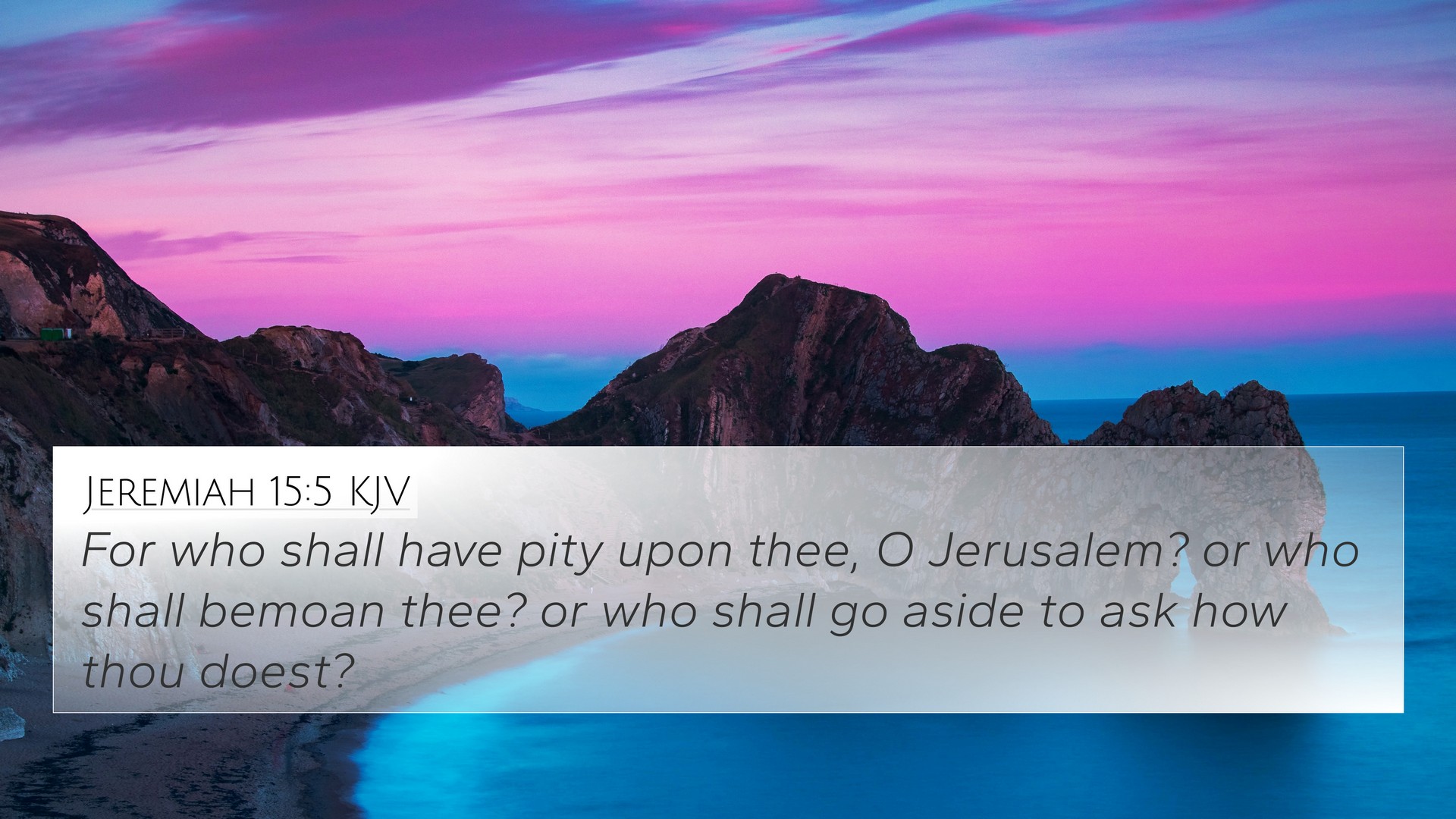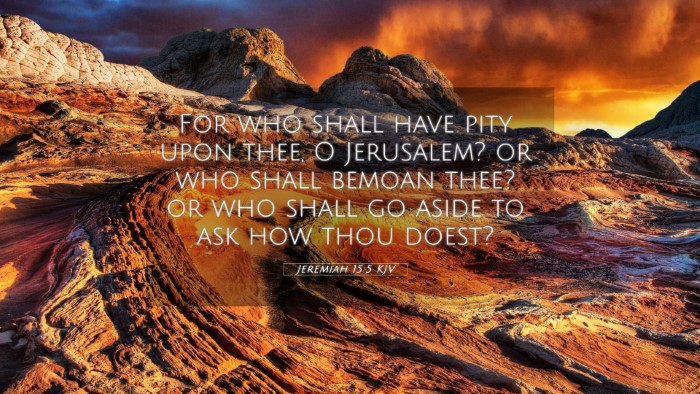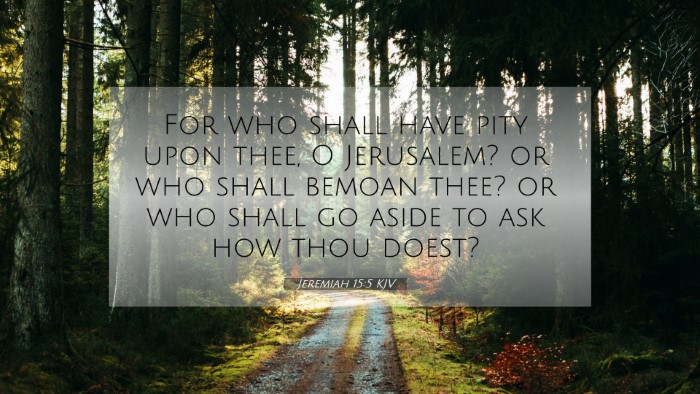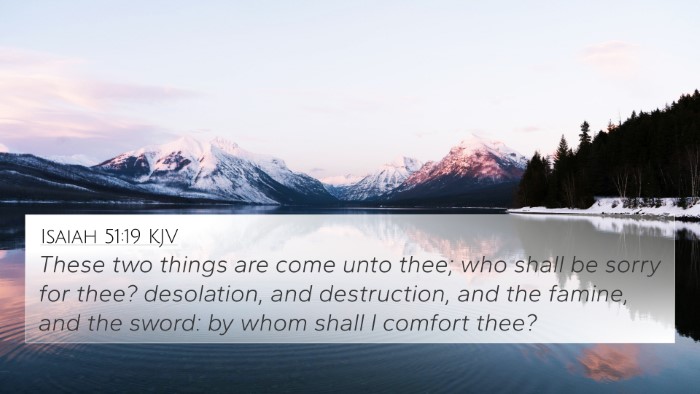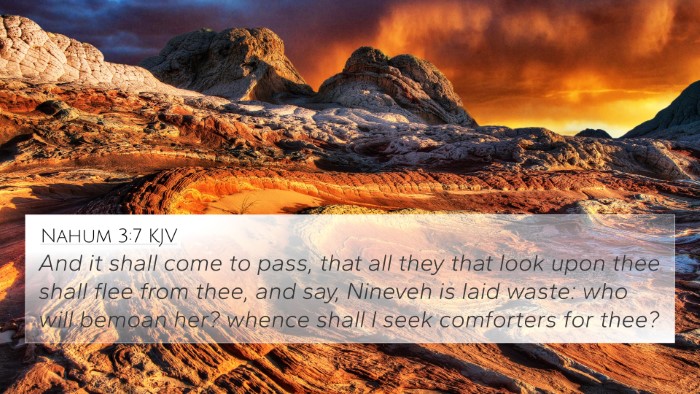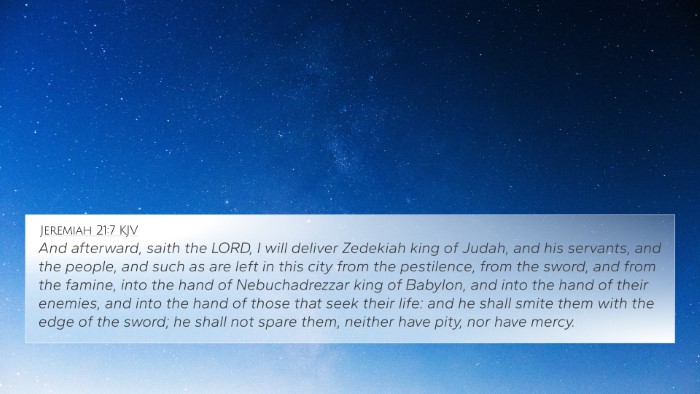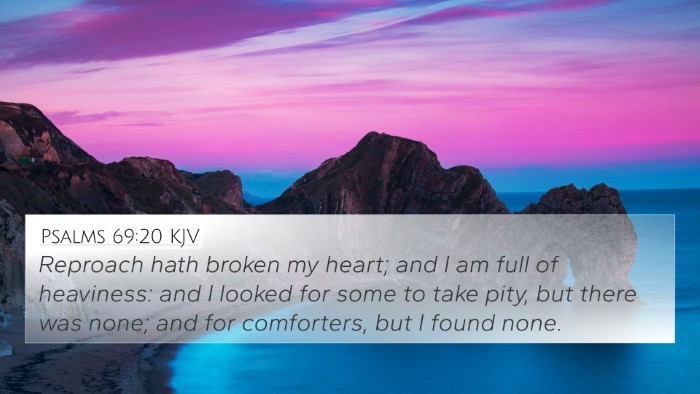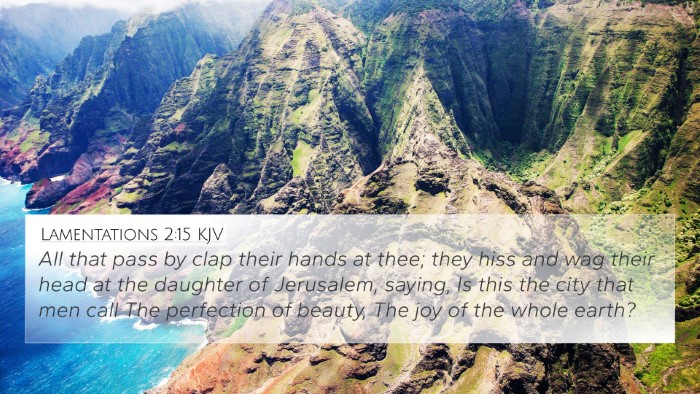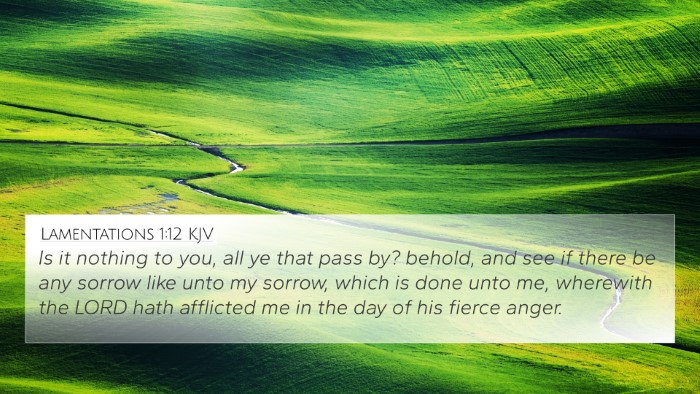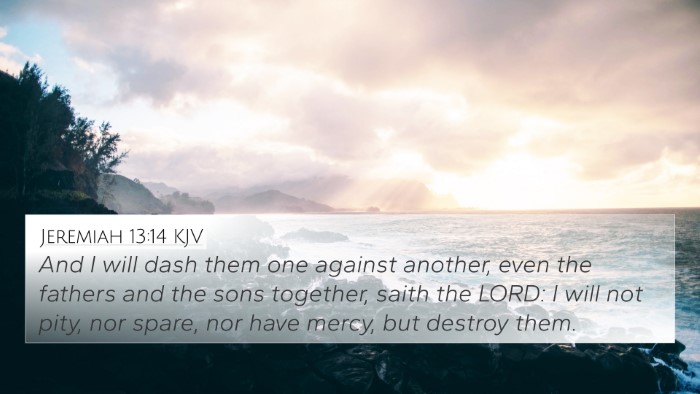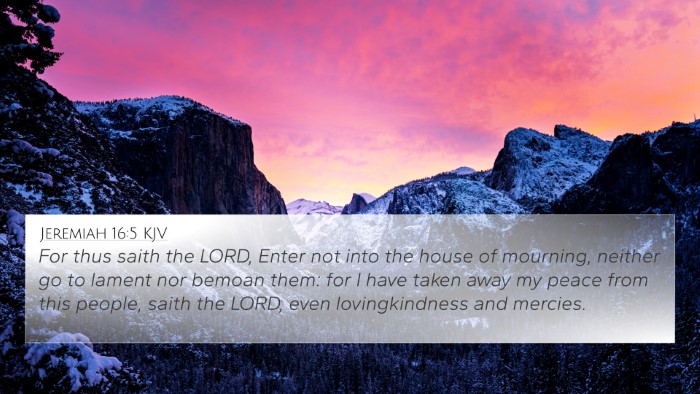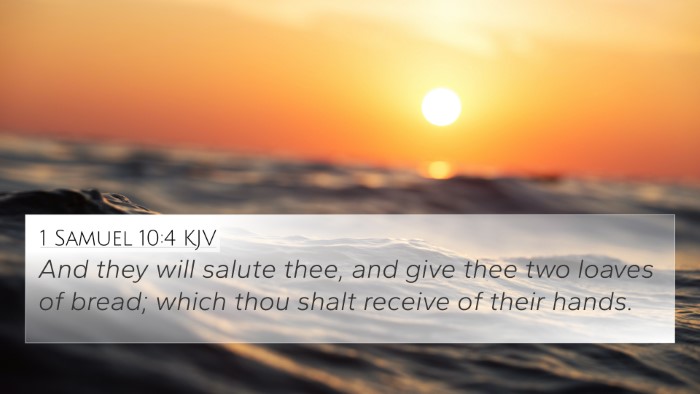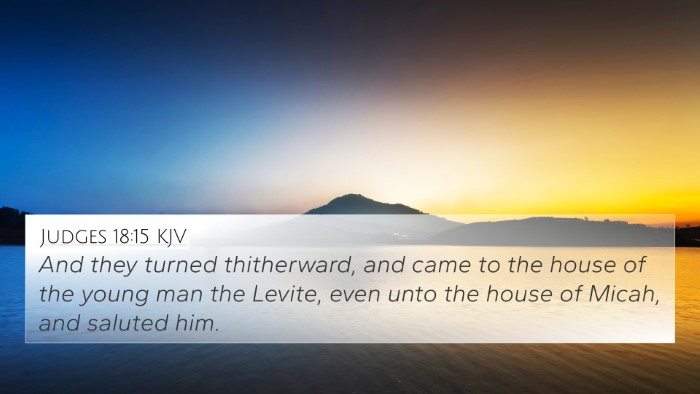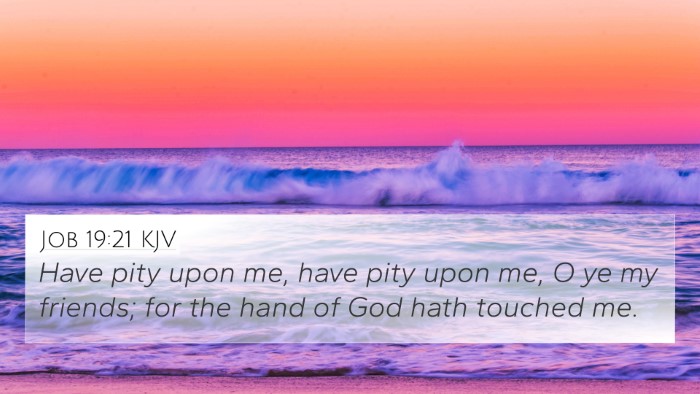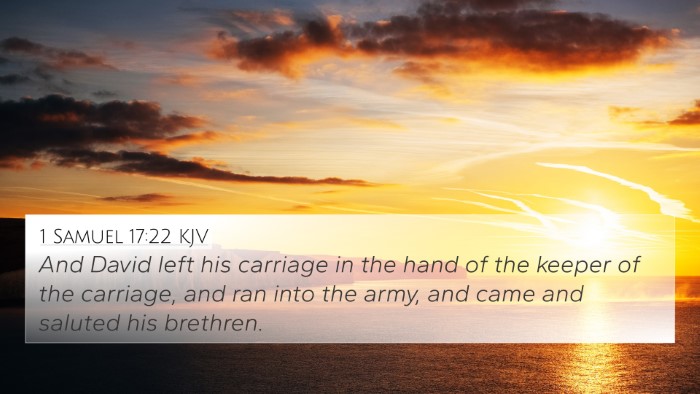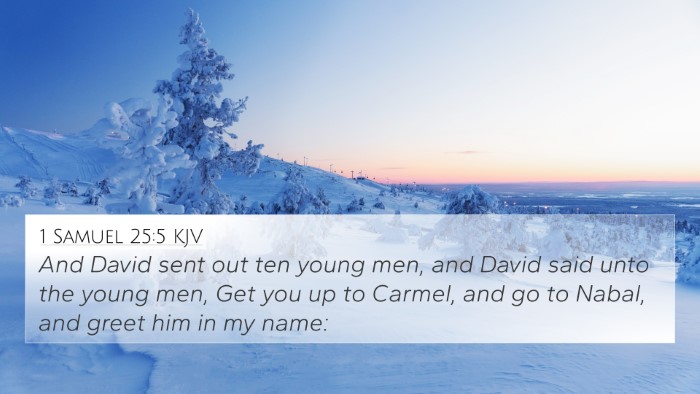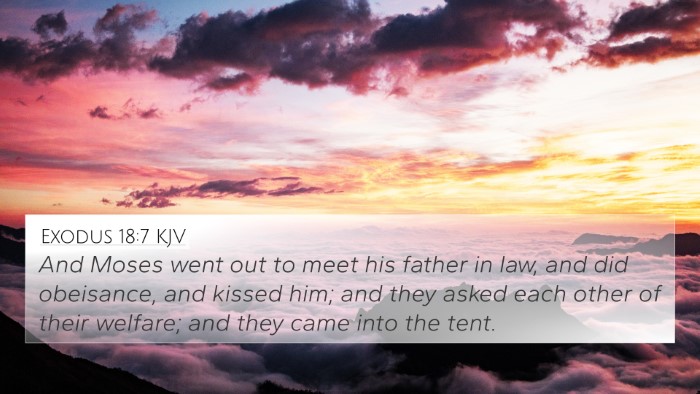Understanding Jeremiah 15:5
Jeremiah 15:5 states:
"For who will have pity on you, O Jerusalem? Or who will bemoan you? Or who will turn aside to ask about your welfare?"
This verse reflects the profound sense of desolation faced by Jerusalem during a time of impending judgment and destruction. The prophet Jeremiah, often known as the 'weeping prophet,' expresses a serious concern for his people and communicates the gravity of their sins before God.
Summary of Insights from Public Domain Commentaries
Here, we combine insights from esteemed commentators to delve deeper into the meaning of this scripture:
-
Matthew Henry:
Henry emphasizes the dire situation of Jerusalem, marking a time when even fellow Israelites would not show concern for its fate. He highlights the abandonment felt by Jeremiah, as the people had turned away from righteousness and thus distanced themselves from God's mercy.
-
Albert Barnes:
Barnes points out the rhetorical questions posed in this verse, implying that there would be no one left to care. He draws attention to the communal judgement that would befall the city, capturing both the physical devastation and the moral responsibility inherent in its downfall.
-
Adam Clarke:
Clarke discusses the historical context of this passage, underscoring the lack of love and compassion that would result from the people's rebellion. His commentary reflects on the broader implications for those who fail to heed God's warnings, leading to isolation and misery.
Key Themes and Messages
This verse carries several significant themes, especially related to...
- Divine Judgment: A key theme in the book of Jeremiah revolves around God’s judgment on sin, where cities and individuals alike face consequences for turning away from divine principles.
- Loneliness in Despair: The verse highlights the solitude that accompanies falling out of favor with God, indicating a time when even those who once cared turn away.
- Prophetic Woe: As a prophet, Jeremiah is burdened with the foreknowledge of destruction, lending a unique perspective on the emotional toll of prophecy.
Cross-References for Jeremiah 15:5
Jeremiah 15:5 connects with several other biblical texts that enhance our understanding of its context and message:
- Jeremiah 14:18: "If I go out into the field, behold, the slain with the sword! And if I enter the city, behold, those who are sick through hunger!" - Illustrating the dire plight facing the people of Jerusalem.
- Lamentations 1:2: "She weeps bitterly in the night, with tears on her cheeks; among all her lovers she has none to comfort her; all her friends have dealt treacherously with her; they have become her enemies." - Reflecting the abandonment felt by the city.
- Micah 7:2: "The good man has perished from the earth, and there is no one upright among men; they all lie in wait for blood; every man hunts his brother with a net." - The loss of righteous individuals during times of trial.
- Ezekiel 18:30: "Therefore I will judge you, O house of Israel, each one according to his conduct," - The importance of individual responsibility in the face of collective sin.
- Matthew 23:37: "O Jerusalem, Jerusalem, the one who kills the prophets and stones those who are sent to her! How often I wanted to gather your children together, as a hen gathers her chicks under her wings, but you were not willing!" - A profound expression of Christ’s lament over the city.
- Revelation 18:2: "And he cried out with a mighty voice, saying, 'Fallen, fallen is Babylon the great!'" - Echoing the theme of destruction of cities due to moral decay.
- Isaiah 51:18: "There is no one to guide her among all the sons she has borne; nor is there one to take her by the hand among all the sons she has brought up." - Similar lament over the desolation of a nation in trouble.
Connecting Themes with Other Scriptures
To enrich the understanding of Jeremiah 15:5, we explore various connections to biblical themes:
Thematic Connections
Cross-referencing biblical texts helps illuminate the common themes found in scripture:
-
Repentance:
Many verses call for repentance in the face of judgment (e.g., Ezekiel 18:32 "For I have no pleasure in the death of anyone who dies," says the Lord God. "Therefore turn and live!")
-
Compassion:
The absence of compassion in times of calamity reflects human nature, echoed in other scriptures (e.g., Proverbs 21:13 "Whoever closes his ear to the cry of the poor will himself call out and not be answered.")
-
Destruction of Zion:
References to Zion's fall can be found in multiple books, creating a thread of prophetic warning (e.g., Daniel 9:26 "And the people of the prince who is to come shall destroy the city and the sanctuary...")
Inter-Biblical Dialogues
Jeremiah 15:5 not only stands alone but also dialogues with parallel stories echoed throughout scripture:
-
Jesus' Teachings:
Jesus often referenced the prophets, especially lamenting over Jerusalem, demonstrating a continuity of prophetic sorrow (e.g., Luke 19:41-44 where Jesus weeps over the city).
-
Pauline Epistles:
The apostle Paul often reflects on the fate of Israel (e.g., Romans 10:1-3 "Brethren, my heart’s desire and prayer to God for Israel is that they may be saved.")
Applications of Cross-Referencing Tools
Using the cross-referencing system can greatly enhance one's understanding of scripture.
- Bible Concordance: A great tool for identifying themes and seeing common phrases across the texts.
- Bible Cross-Reference Guide: Helps in finding not just parallels but also contrasting views in scripture.
- Bible Chain References: Establishes links that lead from one thought to another across different books.
Conclusion
In the verses of Jeremiah, we find profound reflections on human behavior and divine response. Jeremiah 15:5 serves as a poignant reminder of the consequences of turning away from God, the emotional burden of the prophet, and the communal effects of sin. Cross-referencing this scripture with others enriches our understanding and illustrates the interconnectedness of biblical themes.
